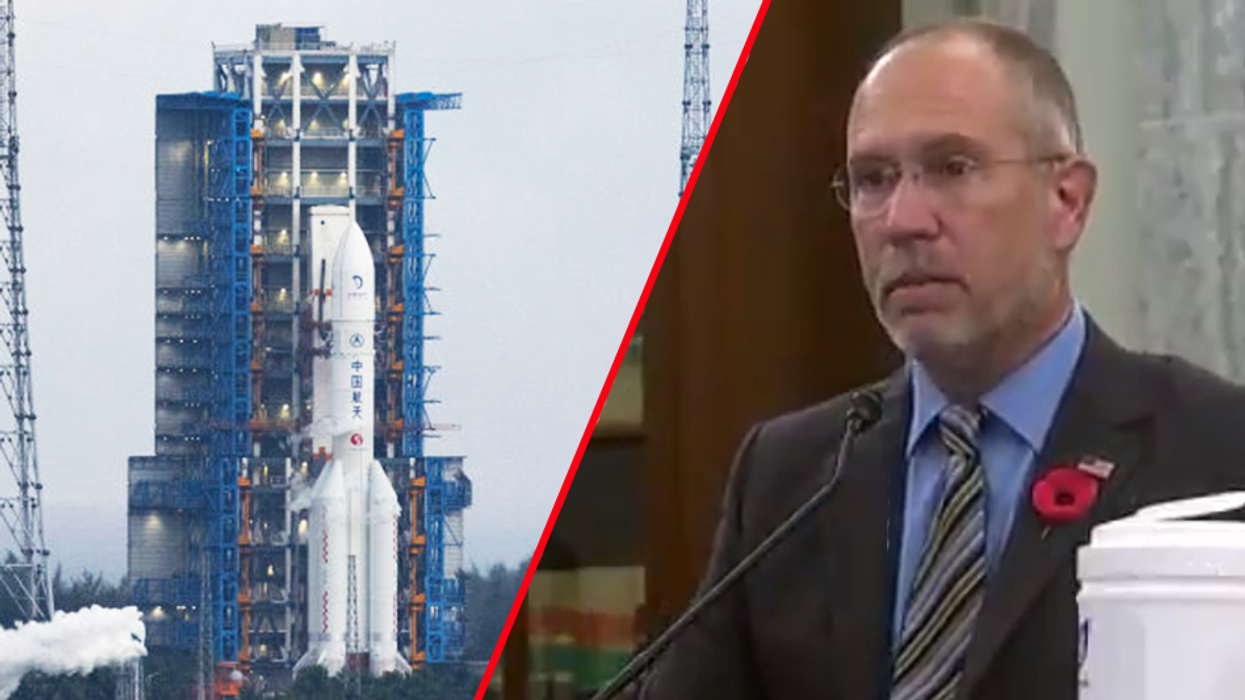
Photos by Greg Autry/X (screenshot)/Ni Yanqiang, Wang Jianan, Wang Jing/Zhejiang Daily Press Group/VCG via Getty Images

Entrepreneur and author Greg Autry said the Chinese government is incredibly close to setting up operations on the moon after the country successfully launched a lunar probe.
Autry, a space policy expert who has been touted as one of the key architects of U.S. space policy during the Trump administration, spoke to Blaze News about the commercialization of space during what he described as a second Cold War.
"I want people to understand we are not 'militarizing' space. We've been there all along."
"The Cold War 2.0, which has clearly emerged whether you like it or not with the U.S. versus China/Russia, is very reminiscent of what drove us into space race 1.0," Autry said. "Those same factors are playing out. Governmental space budgets in the U.S. in particular are increasing rapidly, the Space Force budget's been increased by the Biden administration, more than double since Trump founded it. There's money pouring in for a lot of different reasons," Autry continued.
After the recent launch of the Chang 'e-6, it is clear that the Chinese government has sent a message the United States with where the rocket will land.
Targeted for an early June 2024 arrival on the moon, the lander will settle in a crater called Apollo, an area of the moon's south pole which is know as a "resource rich area" with "access to water ice," Autry revealed. That access is very important to being able to operate on the moon. The region contains different metallic and rare Earth elements, as well.
"The Chinese chose a crater called Apollo — which is named in commemoration of America's great lunar achievement — and the craters inside and adjacent to the Apollo crater are named after individual deceased NASA employees and astronauts," Autry explained.
"I don't think there's any mistake. The Chinese don't make diplomatic protocol mistakes. They're putting their lander in that particular crater and are going to raise their their little Chinese, communist flag; it actually is going to pop up from the lander. That's a message to us [and] we should take it seriously."
Commercially, Autry said it would be about a decade before private companies started bringing anything other than small payloads of moonrocks back to Earth, which he insisted were nothing to "scoff at" given their legitimate commercial value.
Even though there are "no property rights in space," Autry said that he "wouldn't be surprised to see China put some sort of scientific experiments, as they might call them, in various places around the most resource-rich areas" on the moon.
This could happen in "the next three to five years" he said, with China then declaring an "exclusion zone" around the operations to prevent any countries from interfering.
"Even though the resources won't be creating revenues for some time in the future that the areas could be excluded from, this plays well to China's hands. They think far, far ahead. They're thinking decades or centuries of long-term commitment to owning the universe, basically."
Pointing toward private Israeli and Japanese companies that are looking to land on the moon, there is also an interest in mining asteroids, but it would be much more difficult, Autry said.
"There are asteroids out there which can be mined and the rules are essentially the same but there's a lot of individual asteroids and we'd be unlikely, probably, to end up working the same one. The area that's of interest right now is the Moon. The Moon is only three days away whereas those asteroids are months or years away, and the energy required to get to and from the Moon is a lot less than the amount of propellant required to to move things from asteroids."
Autry's new book, "Red Moon Rising," with fellow policy expert Peter Navarro touches on this race to space commercialization. But from a militaristic standpoint, China is looking to gain superiority in fields like communication. The solution is for the Space Force to get a bit more focused and a bit more practical in its leadership.
"I want people to understand we are not 'militarizing' space. We've been there all along. With that said what Trump was looking to do on the advice of myself and other people that were involved in the transition team ... is take and create a more nimble, focused organization where the leadership from the top down cares and understands space."
Noting that generally, the Air Force has high-ranking, former fighter pilots, Autry said the top priority has historically been toward focusing on fighter jets and air superiority.
"The Air Force procurement system is notoriously inefficient (to use a nice word), and so getting space out of there called Space Command and a group called Space Systems Command into their own organization was easier to manage."
Like Blaze News? Bypass the censors, sign up for our newsletters, and get stories like this direct to your inbox. Sign up here!
Andrew Chapados